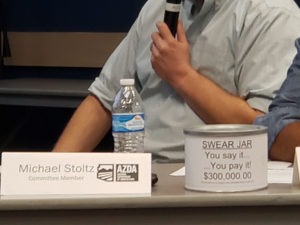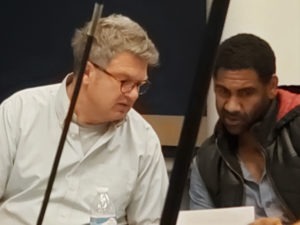BY MIKEL WEISSER
The Dept of AG Industrial Hemp Program monthly public hearings continue to be the best free entertainment in all of AZ bureaucracy. The popularity of the hearings led to an uncomfortably over-full house last month in the auditorium at the Land Use office in the Capitol Complex. This month the hearing moved to an ADOT office space hidden beneath the I-10/I-17 Stack. But the change of venue and the rainy morning traffic did little to deter the eager would-be hemp entrepreneurs that flock to the monthly meetings. Even with a room twice the size of the previous auditorium, seats were still at a premium for much of the three-hour meeting.
The committee is still dealing with adjusting regulatory language in light of the passage of the US Farm Bill. Prior to that landmark piece of legislation reversing an 80yr prohibition, AZ’s industrial hemp program was built to be as restrictive as possible to prevent the criminal element from high jacking the state’s next big cash crop. This month the massive task of overhauling provisions of the program caused the committee to only be able to address the first half of the new rules package (sections 1-6 of 13), but that was still enough to provide plenty of fireworks.
Governor Gives the Go
The biggest piece of good news from the Friday Feb 22nd hearing is that earlier the week Governor Doug Ducey signed Sen Sonny Borrelli’s SB1003, a bill to accelerate the program’s start date from August 1st to May 31st. Farmers who enroll in the program will be harvesting their first crop before the end of the year. Now that the regulations are nearing completion, Dept of AG Industrial Hemp Program Manager, Brian McGrew, was able to distribute handouts of the draft regulations to the committee. The audience even got copies of last month’s minutes and the program charter. Also as promised this month, McGrew and company rolled out their first draft of the proposed fee rates for the different types of licenses the industrial hemp program will issue.
More than 60 would be hemp farmers filled out the website survey to become and another 30 applied to become hemp processors. Thanks to the large number of participants signing up for the pre-program questionnaire, the fees appear to be reasonable and should not block access to the program. (NOTE: all these rates are subject to change between now and the official launch of the program.)
Farmer fees will start out at $1500 for the initial application, with an extra $300 charge if the site expands and needs re-evaluation. Inspection costs are expected to run $25 for the first 100 acres, $75 for an indoor facility (up to three acres) and $150 for each THC sample. Processors will pay $3000 for their application with the $300 charge for modifications. They will be assessed 50₵ per ton on fiber processing, $5 per ton on oil, and $100 for CBD production. Currently no additional fee is planned for farmers who intend to be their own harvester-transporters.
Licensed independent transporters will be charged $150. Brokers intending to buy and sell hemp products and nurseries aiming to develop and market certified hemp seeds will both pay $1000 for their shot at the market. The fees will be used to raise $250,000.00 for “plant services” and $55,000.00 to cover other costs such as regulating the processors and independent testing labs. Starting day one, AZ processors will be able to process hemp from other states.
Doing the Research
Farm Bill-related revisions dominated the discussion of McGrew’s latest rewrites. Even though she was not there that day, committee member Colleen Lanier scored major points with the crowd, when the committee addressed her emailed suggestion that the committee should remove provisions that allowed for no-knock inspections of all hemp facilities by law enforcement officers. As one audience member called out, “Ag is already doing inspections. If they see anything, they can call the cops.” In Lanier’s absence committee member Alex Holley took up the cause, convincing McGrew to strike the paragraph entirely.
Another major discussion concerned the parameters to create for those applying for a research license. Originally the pre-Farm Bill program version of the hemp laws focused heavily on the research angle, but now that hemp is being treated as an acceptable agricultural commodity, the role of researchers has shifted. Previous drafts of the regulations heavily controlled researcher access and focused strictly on institutional research only university and governmental researchers were to be allowed, but the attitude at the February meeting called to expand the access to commercial R&D.
Though committee member JL Echeverria cautioned that the rules needed to prevent folks from gaming the system, committee co-chair, Paco Ollerton defended the idea of providing for researcher access. On hand in the audience, supporting his idea was Dr. Hope Jones, the scientific researcher who assisted in writing the testing provisions in Borrelli’s original hemp bill. Jones, who now has her own research facility in Tempe, encouraged the committee to promote private sector research access. In the end the issue was tabled till the March meeting.
Other Stuff
The biggest unanswered question from the February hearing was the final decision on what will be prohibited under the program (section 11 of 13). In January, program manager Brian McGrew flew into a buzz saw of opposition from both his committee and the packed gallery of would-be hemp farmers when he offered provisions that would prevent hemp operators from marketing consumable hemp products like smokable flower, OTC CBD products and infused consumables. The February meeting agenda did not include discussion of section 11. After the meeting, McGrew acknowledged that that section was still far from settled and would be a central topic in the March meeting when the committee takes up sections 7-13.
Next: to reduce likelihood of confusion leading to law enforcement accidentally raiding hemp farms by mistake the new language explicitly calls for prominently placed signage on all hemp facilities. Anda passage requiring testing all plant materials on a property was also struck, likely saving farmers thousands in unnecessary testing costs.

Also, apparently, Arizona Cannabis Monthly readers weren’t the only people aware of the hilarious blue streak that ran through the committee members’ language during the January hemp hearing. In the aftermath of last month’s “free spirited” forum, the February sessions started off with comically stern housekeeping instructions from chairman Dwayne Alford along with strict rules for both crowd and committee member decorum. In the wake of last month’s repeated audience outbursts, public input was restricted to a formalized Q&A session at the end of the presentation and only those who submitted written questions during the first half of the hearing were allowed to speak. And in an effort to make the hemp talk a little less salty, McGrew even made up a swear jar that was comically passed around the committee tables that read:
“SWEAR JAR
You Say It …
… You Pay It
$300,000.00”
Previous meeting darling, committee member/processor Alex Holley got much good-natured ribbing over his colorful remarks last month, though all in all, the committee members kept their language chaste. The only significant slip appeared to be when German-born hemp scientist Michael Stoltz characterized Colorado’s hemp seed certification program as a “clusterfuck.” It was unclear whether he’ll be paying cash or charge.

Ever the freedom fighter, near the end of the session, Stoltz made a point of asking Arizonans to pay attention to a nationwide struggle going on over the status of CBD. Noting that prior to the Farm Bill passing, pharma giant GW Pharmaceuticals successfully lobbied for CBD restrictions in several states, including AZ. He further noted that a 2017 AZ bill, SB1377, could come into play, if the pharmaceutical company tried to flex its muscles. Originally sponsored by Sen Kate Brophy-McGee (R-LD28) and signed by the governor in April of 2017, the bill states:
“Any compound, mixture or preparation that contains cannabidiol and that is approved by the United States food and drug administration and rescheduled by the United States Drug Enforcement Administration is a controlled substance for the purposes of this chapter and may be prescribed in this state.”
Stoltz explained to the room that as the law currently stands, only GW Pharmaceuticals’ proprietary CBD product, Epidiolex, has been federally approved, so it is the only CBD product that will be allowed to be marketed. Now that the Farm Bill has changed the landscape, Arizona farmers and agri-businessmen have a powerful incentive to get it amended. Someone called out that the public needs to call Sen Sonny Borrelli, the creator of AZ’s hemp program. Someone else called out that the audience needed to contact their own legislators as well to ask them to protect AZ farmers from GW’s attempted power grab.
For readers interested in taking that advice, here’s how to do it. You can find out who your legislators are here and get their phone numbers and email addresses here.
—Mikel Weisser is the editor and chief staff writer for Arizona Cannabis Monthly and state director of AZ-NORML


